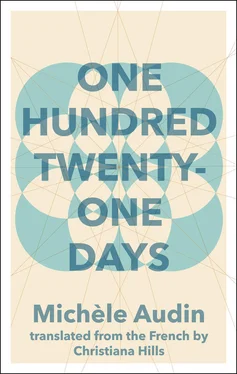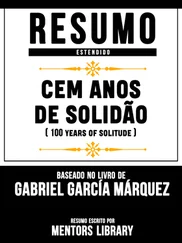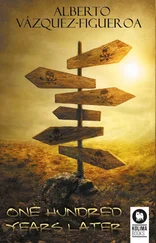His name was Louis Klein and he lived in Paris, near the Raspail metro station. It was through him that Mireille finally found out about André’s death. He didn’t know André’s last name, only his first name: André, his name was André. That was why he hadn’t been able to let anyone know. He recognized him in a photograph, taken at Clermont-Ferrand during a picnic, that Mireille showed him.
“That doesn’t really look like him,” he said, but then he started over.
It wasn’t that the photograph didn’t look like him, but rather that the deportee he had known in January 1945 didn’t look like him.
“That’s him, those are his eyes, and he was from Strasbourg, a mathematician, his name was André, no doubt about it. I’m sorry to be the one to tell you,” he said, “but he died. Right before my eyes.”
And he started to cry.
Not Mireille. She wanted to know, she waited. They had met after the march, on the train; they’d ended up in a corner of a freight car. A corner was a relative shelter — Klein explained how Meyerbeer had fallen, been trampled on, and died, from that or from everything that had come before, and how his body had been thrown off the train.
“Thrown,” he repeated, shaking his head. “But André and I,” he continued, “after having survived the march, we survived the uncovered freight cars and the snow, and we knew that we were saved, that the war had already ended, that we were going to go home. We were laughing with happiness,” he added through tears. “But André died. Two days later, the camp was liberated. It was a makeshift camp, called Mariahilf.”
It was over. He hadn’t disappeared. Someone had seen him die. Someone knew where he had died. Someone knew what day and what time he had died. It was no longer possible to imagine that he had gotten lost or detained somewhere, in a Saxon forest or a Polish hospital. He wouldn’t be coming back. He was dead.
Mireille let the family know, by way of a short letter to Clara. The Silberbergs kept ownership of their grief, which they wouldn’t share any more than they had shared their anguish.
She also wrote to Doctor Sonntag and Professor Pariset.
To Daniel Roth, beheaded in a Bavarian prison (whether or not any of those German historians who had been asked to help had actually cared about his fate); to Pariset’s brother, shot as a member of the Resistance with his philosopher cousin; to Robert Desnos, the poet who died of typhus one month after the war ended; to the anonymous millions especially, who weren’t done being counted and who wouldn’t be coming back; to Doctor Meyerbeer, who was thrown off a freight car in who even knows what country, André Silberberg must be added.
Mireille was remembering, counting the days, calculating. We knew each other, but what does that mean, to know someone? We saw each other for the first time, even before we had really spoken, Clara introduced us, that was February 23rd, he had come to wait for me after Schmitt’s class. He was so tall! Then there was the day he played piano in a room at the university, every once in a while a whole group would come to hear him, and he had asked Clara to invite me, “ask your friend with the blue eyes if she wants to come,” that was a Sunday, March 7th, he had played Bach, and then Mozart’s Fantasia. And then the picnic, a long trip, almost all the way to Saint-Nectaire, mainly to get some cheese from a farmer, on bikes, our landlord’s wife had let me borrow hers, it was still cold but it was the first day of spring. How carefree we were! We still hadn’t really spoken, and then, one of the girls, Madeleine Feinstein, who was slightly scatterbrained, said she’d never understood anything in math. Another one of them, Simone Bamberger, said it was stupid, but no one knew why she thought it was stupid. And of course Clara said something, that her brother was a genius. I don’t know why, maybe because he was watching me, but I wanted to add my two cents, that I had an uncle who was a mathematician, but I didn’t know him, I had never even met him. He reacted immediately, I had to say his name. Ah! Robert Gorenstein, of course he knew him — well, he knew his work, he had even written to him once, before the war. Gorenstein had sent him a letter and one of his articles in return, thanks to which he had found the answer to his question. That day was March 21st, he rode his bike back with me right to my house, that is, where Mama and I were staying at the time, leaving Clara and the others to go back without him. And two days later, on March 23rd, since the class was on Tuesdays, he was there, outside the lecture hall when I came out, he was waiting for me. Clara had caught a cold during the picnic, she had stayed home, which he knew, of course, that was why he had come. We walked side by side down the street. Then we saw each other more, we took walks together, usually without saying anything. And then there was the time Clara invited me over to their house, that was the day he gave me his article, “On a Few Theorems from Class Field Theory,” by André Danglars, that’s me, he had said while laughing, that way I no longer risk having my articles rejected.
And April 28th, the day he said it to me.
Mireille always thought “he said it to me,” without anything more, because what he had said was unheard of, in the proper sense, and also too intimate for her to express with words, even with the words he had in fact uttered, and which, of course, she kept hearing.
A few weeks of meetings, of confessions, of happiness, of being carefree, until the last day they had agreed to meet, June 25th, when he didn’t come. And that was it.
Mireille was counting the days, but how? From February 23rd to June 24th, one hundred twenty-one days, from when, say, our eyes met for the first time. Or from April 28th to June 24th, not even two months. Mireille was counting the days, and the words André had said to her.
Hard words, for life in Strasbourg.
Sad words, for the war, when she had told him that her father had been killed. Before France signed the Armistice with Germany in 1940, André had fought as an aviator, and he had made a friend from Paris, also a mathematician and an aviator, who was killed in flight — that blitzkrieg had been so bloody — he’d had a young wife, they’d been expecting a baby, and then André had added that his friend’s father had also been killed, in August 1914, before his son was even born — Mireille had heard the sob in André’s voice.
Serious words, to talk about Mozart’s Fantasia.
Rebellious words, to tell her about the last class he taught, at the high school in Digne, in December 1940, when his teaching position was revoked in accordance with the Statute on Jews, and about one student, just one, but one student all the same, who had come to shake his hand at the end of the class period.
Joyful words, when he had finished proving his “fundamental” lemma, which had given him so much trouble, this will be in my dissertation, and it’ll rile up — Mireille remembered he had said rile up — an arrogant German I know. That’s when he had talked about Daniel Roth and Dante’s Inferno .
Playful words, to explain how he chose his pseudonym. For Silberberg, he could have chosen something related to the French words for “silver” and “mount,” like Largent, or Mondargent, but that was too transparent, too risky. He had also thought about Winckler, which was the maiden name of one of his grandmothers who wasn’t Jewish, but, alas, it was still a Jewish name, no luck, how he had laughed! So he had translated: Winkel = angle, Winckler = Dangle, Danglars, a real name, a well-known name, and even the name of the traitor in a famous French novel.
Confident words, to say I’m totally safe because I’m publishing under the name of Danglars.
Читать дальше












